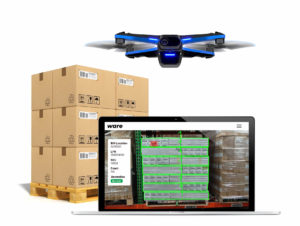
The drone industry excels at addressing expensive and slow processes that can be dramatically improved with aerial assets. One San Francisco startup has identified a major need in a $1.9 trillion industry, and they’re solving it with a combination of easily available commercial hardware and their own sophisticated software systems. Ware announced a new drone-based inventory management system that works with a Skydio 2 drone to dramatically reduce the cost and improve the speed of taking inventory.
DRONELIFE interviewed Ware co-founder and CEO Ian Smith. (You may have heard of Ian Smith from his popular podcast, Commercial Drones FM.) Smith talked about solving real problems and why the warehousing industry is the perfect space for drone technology right now.
The Right Time for the Right Solution

In the warehousing industry, says Smith, managers have been searching for an automated solution to track inventory for years. Now that drones have now developed to allow automation and obstacle avoidance indoors, the right solution is at hand. “Automated indoor use cases have always been exciting but have historically been disregarded as improbable due to the difficulty of having the aircraft navigate indoors safely in a GPS-denied environment,” says Smith. “Today, the capability of drone technology has increased to the point where it makes new, indoor use cases possible.”
“Warehouses and distribution centers have been clamoring for solutions to help track their inventory reliably and accurately,” Smith says. “Today, we can finally make this a reality with the combination of state-of-the-art drone hardware and machine learning techniques for processing the data.”
Automation also makes it possible for almost anyone to utilize the solution – and the indoor nature of warehousing makes compliance with regulations less difficult. “A core ethos of our company is that automation is a good thing. For most commercial jobs, flying robots should be automated—operating without a human pilot,” says Smith. “Because our customers’ operations are indoors, we’re outside of FAA jurisdiction and therefore, have been able to implement true automation.
This isn’t vaporware. The workflow actually exists and it’s being used by customers today.”
The Right Hardware to Match the Right Software
Instead of developing their own hardware – a path that has led many drone startups to an early end – Ware has focused on their software solution and partnered with hardware company Skydio. Skydio has made a big impact on the drone industry with their small form factor and relatively inexpensive automated drone: and in the small world of California drone startups, the companies already knew each other. “We partnered with Skydio because, frankly, they make the smartest drone on the planet. Nothing else even comes close to matching it on being able to navigate and follow our instructions indoors, while maintaining flexibility and safety,” says Smith. “We’ve been keeping an eye on Skydio’s developments from R1 to Skydio 2 and fortunately, we have some past history with the company. My co-founder, Joe Moster, is good friends and old colleagues with Skydio’s Commercial Product Manager and I’ve had my own relationship with Skydio’s CEO, Adam Bry, over the years.”
“It was a natural fit for us to partner as they were also looking for a company like us to flex our unique tech to really showcase the power of their new platform, Skydio 2.”
The Market is Ready
Ware is responding to a known problem with a solution that works – and the market is ready to learn about it. “The response from customers is incredible. We’re getting entire supply chain departments of large, Fortune 100 organizations—from directors to senior managers—coming out on the warehouse floor to watch the drones fly autonomously and excitedly listing off all of the new efficiencies they’ll gain by implementing our solution,” says Smith.
“The bigger an organization gets, the more they benefit from our technology. It’s always been a big challenge to ensure that inventory is being counted accurately and cost effectively.”

Miriam McNabb is the Editor-in-Chief of DRONELIFE and CEO of JobForDrones, a professional drone services marketplace, and a fascinated observer of the emerging drone industry and the regulatory environment for drones. Miriam has penned over 3,000 articles focused on the commercial drone space and is an international speaker and recognized figure in the industry. Miriam has a degree from the University of Chicago and over 20 years of experience in high tech sales and marketing for new technologies.
For drone industry consulting or writing, Email Miriam.
TWITTER:@spaldingbarker
Subscribe to DroneLife here.







[…] The complete article is here […]